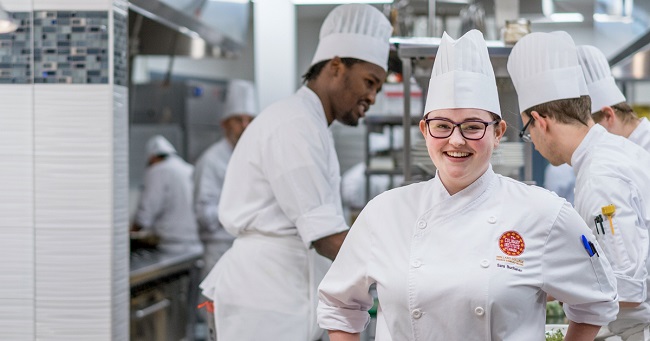Are you a budding chef eyeing a top-notch culinary education abroad? Canada might just be your perfect destination! Known for its high-quality education system, Canada boasts excellent culinary arts schools that attract students from around the world. In this article, we’ll unveil the best Culinary Arts Schools in Canada for International Students, offering a blend of skillful training and culinary expertise, ideal for international students seeking a fulfilling culinary journey. Let’s explore the exciting culinary landscape Canada has to offer!

Eligibility Criteria
Before diving into the world of culinary education in Canada, it’s crucial to understand the eligibility criteria required for admission. Generally, institutions offering culinary courses seek the following:
- Educational Background: A high school diploma or equivalent is typically required. Strong emphasis may be placed on culinary arts or hospitality management subjects.
- English Proficiency: Demonstrated English language proficiency through tests like IELTS or TOEFL is essential. Meeting the minimum required scores is vital for admission.
- Relevant Experience: Some programs may look for prior experience or internships in the culinary field. This demonstrates your commitment and passion for the industry.
- Letter of Recommendation: Letters of recommendation from previous educators or employers can enhance your application and showcase your capabilities.
5 Culinary Arts Schools in Canada for International Students
Here is our list of the top five culinary arts schools in Canada for international students:
Culinary School, LaSalle College
- Fees: LaSalle College offers competitive tuition fees of around CAD 32,000, making it accessible for international students.
- Program Length: The culinary program typically spans two years, ensuring comprehensive training.
- Eligibility for International Students: International students can apply upon meeting the required academic and English language proficiency standards.
LaSalle College’s culinary school is committed to providing a well-rounded culinary education. The program delves into various culinary techniques, gastronomy, and management skills. With a balance of theoretical knowledge and hands-on training, students are well-prepared for a successful culinary career.
Culinary Institute of Canada, Holland College
- Fees: The tuition fees for international students are approximately CAD 35,000 for the two-year program.
- Program Length: The culinary arts diploma program spans two years, focusing on practical training.
- Eligibility for International Students: International students must fulfil grade 12 graduation requirements and provide a resume highlighting relevant culinary experience.
The Culinary Institute of Canada, affiliated with Holland College, offers an enriching culinary arts program. Students benefit from state-of-the-art facilities and a curriculum that nurtures creativity and skill development. The emphasis on hands-on experience equips graduates for the dynamic culinary industry.
Algonquin College of Culinary Studies
- Fees: Algonquin College offers competitive tuition fees, providing an affordable option for international students.
- Program Length: The culinary program typically lasts two years, ensuring in-depth culinary education.
- Eligibility for International Students: International students must meet the academic and English language proficiency criteria to be eligible for admission.
Algonquin College of Culinary Studies provides a comprehensive culinary program that covers fundamental skills and advanced culinary techniques. The institution focuses on fostering creativity, teamwork, and professionalism, setting the stage for a successful culinary career.
The Culinary Arts School of Ontario
- Fees: Tuition fees for international students vary based on the program, with the professional chef diploma costing approximately CAD 14,000.
- Program Length: The programs include a 37-week sous chef diploma and a 54-week professional chef diploma.
- Eligibility for International Students: International students must meet graduation requirements, demonstrate English proficiency, and clear an entrance test.
The Culinary Arts School of Ontario offers specialized culinary programs tailored to international students. With a focus on practical skills and industry knowledge, students are prepared for the demands of the culinary world.
Chef School, George Brown College
- Fees: Tuition fees for international students are competitive and provide good value for the program’s quality.
- Program Length: The culinary program typically spans two years, providing thorough training and skill development.
- Eligibility for International Students: International students need to fulfil academic requirements and demonstrate proficiency in the English language.
George Brown College’s Chef School stands as a hallmark of culinary education in Canada. Their program offers a blend of theoretical knowledge and hands-on experience, preparing graduates to excel in diverse culinary settings. The school’s industry connections and experienced faculty provide a rewarding learning experience for aspiring chefs.
Navigating the Application Process
Research and Choose Your Program
Begin your journey by researching various culinary programs offered in Canada. Consider program duration, curriculum, faculty expertise, and available specializations. Choose a program that aligns with your career goals and interests.
Gather Necessary Documents
Prepare a comprehensive application package that includes:
- Transcripts and Certificates: Ensure you have all your academic documents in order.
- English Language Proficiency Scores: Provide the required scores from approved language proficiency tests.
- Resume/CV: Highlight your relevant experience, if any, in the culinary field.
- Statement of Purpose (SOP): Craft a compelling SOP explaining your passion for culinary arts and your reasons for choosing the specific program and institution.
- Letters of Recommendation: Obtain well-drafted letters from academic or professional contacts.
Submit Your Application
Follow the guidelines the chosen institution provides and submit your application through their online portal or by mail. Double-check that you’ve included all required documents and information.
How Much Does It Cost To Study Culinary In Canada?
Studying abroad involves financial planning, and understanding the costs associated with culinary courses in Canada is essential. The costs may include:
- Tuition Fees: Culinary program fees vary based on the institution and program level. On average, tuition fees range from CAD 10,000 to CAD 35,000 per year.
- Accommodation: Consider the cost of living and accommodation, which varies by city and lifestyle. On-campus housing or off-campus options like shared apartments should be factored in.
Living Expenses: Budget for daily expenses, including food, transportation, utilities, and personal items. A reasonable estimate is approximately CAD 10,000 to CAD 15,000 per year.
Conclusion
Canada offers international students a rich tapestry of culinary education opportunities. The outlined culinary schools – LaSalle College, Culinary Institute of Canada at Holland College, Algonquin College of Culinary Studies, The Culinary Arts School of Ontario, and Chef School at George Brown College – each offer distinctive programs designed to equip aspiring chefs with the necessary skills and knowledge to thrive in the culinary industry.
Whether it’s the hands-on training, the emphasis on creativity and innovation, or the practical application of culinary techniques, these schools ensure a holistic approach to culinary education. Moreover, the varying program lengths, competitive tuition fees, and diverse eligibility criteria cater to a wide range of international students.
Embarking on a culinary journey in Canada provides a solid foundation in culinary arts and an enriching cultural experience. As international students immerse themselves in the vibrant Canadian culinary scene, they not only master the art of cooking but also form lasting memories and establish valuable professional connections.

